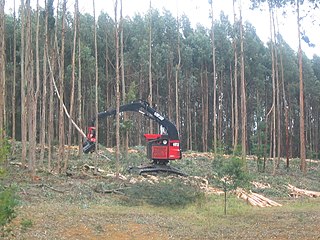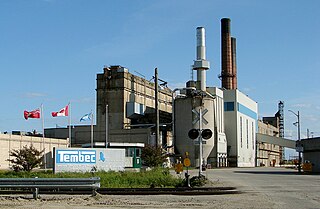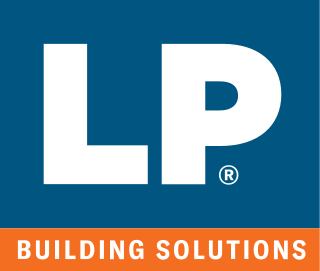
Pulp is a fibrous lignocellulosic material prepared by chemically, semi-chemically or mechanically producing cellulosic fibers from wood, fiber crops, waste paper, or rags. Mixed with water and other chemicals or plant-based additives, pulp is the major raw material used in papermaking and the industrial production of other paper products.
Boise Cascade Company is an American manufacturer of wood products and wholesale distributor of building materials, headquartered in Boise, Idaho.

The International Paper Company is an American pulp and paper company, the largest such company in the world. It has approximately 56,000 employees, and is headquartered in Memphis, Tennessee.

Paperboard is a thick paper-based material. While there is no rigid differentiation between paper and paperboard, paperboard is generally thicker than paper and has certain superior attributes such as foldability and rigidity. According to ISO standards, paperboard is a paper with a grammage above 250 g/m2, but there are exceptions. Paperboard can be single- or multi-ply.

Pulpwood can be defined as timber that is ground and processed into a fibrous pulp. It is a versatile natural resource commonly used for paper-making but also made into low-grade wood and used for chips, energy, pellets, and engineered products.

Tembec Industries Inc., known as Tembec, was a paper company in Canada, founded by Frank Dottori. In 2011, Tembec had approximately 3000 employees, with locations in Canada, United States, and France. Tembec's operating divisions included Forest Products, Pulp, Paper & Paperboard, and Chemicals.
David Lee Emerson, is a Canadian politician, financial executive, and economist. He was formerly the Member of Parliament for the riding of Vancouver Kingsway. He was first elected as a Liberal and served as Minister of Industry under Prime Minister Paul Martin. After controversially crossing the floor to join Stephen Harper's Conservatives, he served as Minister of International Trade and Minister for the Pacific Gateway and the Vancouver-Whistler Olympics, followed by Minister of Foreign Affairs.

Louisiana-Pacific Corporation (LP) is an American building materials manufacturer. The company was founded in 1973 and LP pioneered the U.S. production of oriented strand board (OSB) panels. Currently based in Nashville, Tennessee, LP is the world's largest producer of OSB and manufactures engineered wood building products. LP products are sold to builders and homeowners through building materials distributors and dealers and retail home centers.
The Jim Pattison Group is a Canadian conglomerate based in Vancouver. In a recent survey by the Financial Post, the firm was ranked as Canada's 62nd largest company. Jim Pattison, a Vancouver-based entrepreneur, is the chairman, CEO, and sole owner of the company. The Jim Pattison Group, Canada's second largest privately held company, has more than 45,000 employees worldwide, and annual sales of $10.1 billion based on investments in Canada, the U.S., Mexico, Europe, Asia and Australia. The Group is active in 25 divisions, according to Forbes, including packaging, food, forestry products.

Kraft paper or kraft is paper or paperboard (cardboard) produced from chemical pulp produced in the kraft process.
Peter John Gerald Bentley, was a Canadian businessman and the third Chancellor of the University of Northern British Columbia.

Catalyst Paper Corporation is a pulp and paper company based in Richmond, British Columbia. It operates five pulp mills and paper mills, producing a combined 1.8 million tonnes of paper and 491,000 tonnes of market pulp annually. The mills mostly produce magazine paper and newsprint.

West Fraser Timber Co. Ltd., commonly known as "West Fraser", is a Canadian forestry company that produces lumber, laminated veneer lumber (LVL), medium-density fibreboard (MDF), oriented strand board (OSB), plywood, pulp, newsprint, and wood chips. Based in Vancouver, British Columbia, the company is a member of the Forest Products Association of Canada. As of 2023, West Fraser had been recognized eight times as one of Canada's Top 100 Employers.
Poldi or Poldy may refer to:

James Allen Pattison is a Canadian business magnate and investor. He is based in Vancouver, British Columbia, where he holds the position of chief executive officer, chairman and sole owner of the Jim Pattison Group, Canada's second largest privately-held company, with more than 45,000 employees worldwide, and annual sales of $10.1 billion. The Group is active in 25 divisions, according to Forbes, including packaging, food, and forestry products.

A forest product is any material derived from forestry for direct consumption or commercial use, such as lumber, paper, or fodder for livestock. Wood, by far the dominant product of forests, is used for many purposes, such as wood fuel or the finished structural materials used for the construction of buildings, or as a raw material, in the form of wood pulp, that is used in the production of paper. All other non-wood products derived from forest resources, comprising a broad variety of other forest products, are collectively described as non-timber forest products (NTFP). Non-timber forest products are viewed to have fewer negative effects on forest ecosystem when providing income sources for local community.

The environmental effects of paper are significant, which has led to changes in industry and behaviour at both business and personal levels. With the use of modern technology such as the printing press and the highly mechanized harvesting of wood, disposable paper became a relatively cheap commodity, which led to a high level of consumption and waste. The rise in global environmental issues such as air and water pollution, climate change, overflowing landfills and clearcutting have all lead to increased government regulations. There is now a trend towards sustainability in the pulp and paper industry as it moves to reduce clear cutting, water use, greenhouse gas emissions, fossil fuel consumption and clean up its influence on local water supplies and air pollution.

Crofton Mill is a pulp mill and paper mill located in the Vancouver Island town of Crofton, British Columbia. The mill has 3 paper machines and 2 pulp machines, which produce 349,000 tonnes of newsprint and directory paper, and 355,000 tonnes of northern bleached softwood kraft.
The wood industry or timber industry is the industry concerned with forestry, logging, timber trade, and the production of primary forest products and wood products and secondary products like wood pulp for the pulp and paper industry. Some of the largest producers are also among the biggest owners of timberland. The wood industry has historically been and continues to be an important sector in many economies.

The American Wood Council (AWC) is a trade association that represents North American wood products manufacturers.














